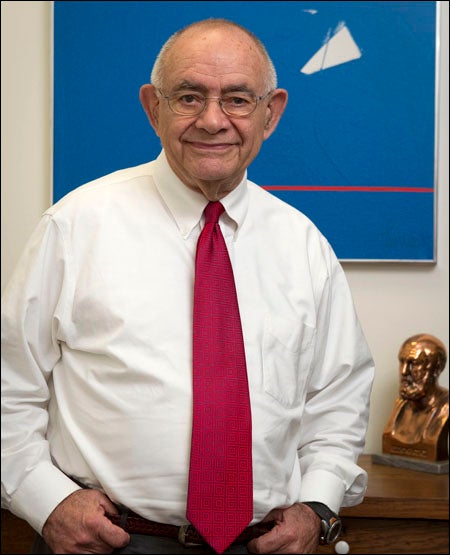‘A great joy and privilege’
Walter Pories Professor of surgery Brody School of Medicine

Walter Pories
(Photo by Cliff Hollis)
Following a career as a surgeon and a military officer, Walter Pories, 82, will be one of nine inductees this year in the East Carolina University Distinguished Military Service Society.
A Holocaust survivor who fled Germany with his family in 1939, Pories is a professor of surgery, biochemistry and sport and exercise science at ECU. He spent 24 years on active duty in the Air Force and in the Army reserves.
As a new medical school graduate, Pories enlisted in the Air Force in 1955. His first assignment was at a 25-bed hospital in Toul Rosieres Air Base, France, where he served as surgeon and obstetrician. He then returned to the United States to complete training in general and cardiothoracic surgery.
After that, Pories was named chief of surgery at Wright Patterson Air Force Base, Ohio, where he became involved in research in trace element nutrition and the design of ejection seats for fighter aircraft.
“This was during the Vietnam War, so much of my time was spent caring for the wounded who were flown in from Tokyo,” Pories said. “During those times, I was also a flight surgeon in Libya, inspected clinics in Europe, served as the unit’s veterinarian for the K-9 Corps and even spent a very short time — about four hours — in Vietnam.”
After 12 years as a career officer, Pories resigned from the Air Force.
When Pories came to ECU in 1977 to chair the new Department of Surgery, Dr. William Laupus, dean of the medical school, expressed concerns about the level of care at Fort Bragg, Seymour Johnson Air Force Base and Marine Corps Base Camp Lejeune.
“He told us, with deep conviction and drama, that as the regional medical school we had to do far, far more than just give lectures,” Pories said. “We had to join the Reserves and really, really get involved.” Since there were no USAF reserve units in the area, I joined the Army.”
Pories rose to commander of a unit made up of medical faculty members from ECU, the University of North Carolina at Chapel Hill and Duke University and served as commander of Womack Army Medical Center at Fort Bragg during the Grenada and Panama operations in the 1980s and the first Gulf War.
“After 24 years, to the military’s great relief, I retired with the rank of colonel, a Legion of Merit and a Presidential Citation for my unit,” Pories said.
“On a serious note, serving in the military was a great joy and privilege that I appreciated deeply, especially as a Holocaust survivor.”